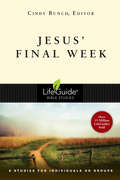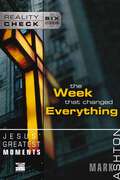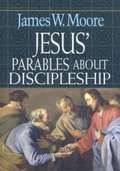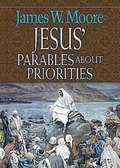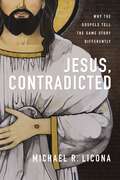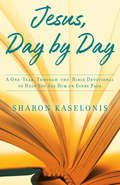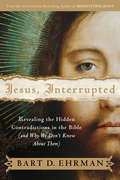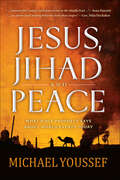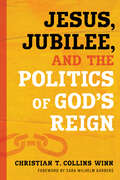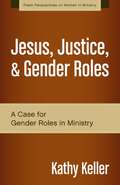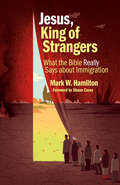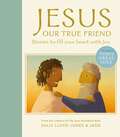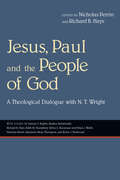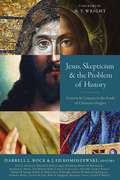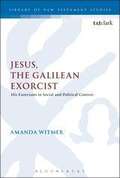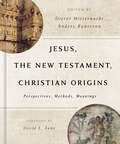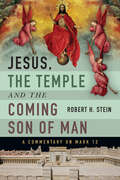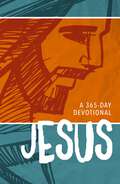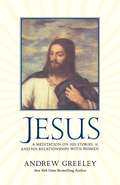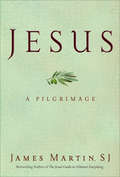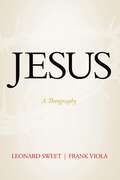- Table View
- List View
Jesus' Final Week (LifeGuide Bible Studies)
by Bunch CindyThe events that took place during Jesus' final week on earth—Palm Sunday, the Last Supper, the trial, Jesus' death and his resurrection—are foundational to your salvation and your Christian life. As these Bible studies allow you to focus more closely on these amazing events, you'll gain new understanding about who Jesus is and how he loves you. This eight-session LifeGuide Bible Stud features questions for starting group discussions and for meeting God in personal reflection. Leader's notes are included with information on study preparation, leading the study and small group components as well as helps for specific Bible passages covered in the study. Presented in a convenient workbook format and featuring the inductive Bible study approach, LifeGuides are thoroughly field-tested prior to publication; they're proven and popular guides for digging into Scripture on your own or with a small group. For over three decades LifeGuide Bible Studies have provided solid biblical content and raised thought-provoking questions—making for a one-of-a-kind Bible study experience for individuals and groups. This series has more than 130 titles on Old and New Testament books, character studies, and topical studies. PDF download with a single-user license; available from InterVarsity Press and other resellers.
Jesus' Greatest Moments: The Week That Changed Everything (Reality Check)
by Mark AshtonThe Reality Check series makes just one assumption: that you’re serious enough about your spiritual journey to investigate Christianity with an open mind. This isn’t about joining anyone’s religious club—it’s about being real with yourself and with the others in your group. Since no one has all the answers, there’s plenty of room for discussion. After all, if there is any truth to the Bible’s stories about Jesus, then one thing he’d welcome are questions and opinions that come from honest, earnest hearts.Never has one week made such a far-reaching difference. It began with the applause of the masses for their controversial hero. It darkened into betrayal, a kangaroo court, and a brutal execution. And it concluded with an event so stunning that it has shaped history ever since: the resurrection of Jesus from the dead. As you relive the dramatic highs and lows of this unparalleled week, you’ll discover why Jesus was far more than a great moral teacher—and why, among all other religious leaders, Jesus stands without equal.Jesus’ Greatest Moments includes these sessions: The Grand Entrance Betrayed by a Friend Framed!? A Dramatic Crisis The Comeback! A Startling ImpactFor the Group LeaderReality Check is for spiritual seekers of every persuasion. Uncompromisingly Christian in its perspective, it steers wide of pat answers and aims at honesty. This innovative and thought-provoking series will challenge you and those in your group to connect heart to heart as together you explore the interface between Jesus, the Bible, and the realities of this world in which we live.
Jesus' Little Instruction Book
by Thomas CahillJesus' teachings have reached across two millenia, inspiring, informing, and uplifting people from all walks of life. In this elegant little volume, a noted religious publisher and biblical student has collected Jesus' key messenges, culled from the Gospels. Organized thematically, Jesus' words speak directly to contemporary lives and convey a man unlike any other man whose life contains a message for all. Engaging and nondoctrinal commentary throughout places the sayings in their historical context and drawn to this simple and beautiful rendering of Jesus' unique--an, even today, unconventional--message for the heart.From the Trade Paperback edition.
Jesus' Parables About Discipleship
by James W. MooreThis six-session short-term study series from Jim Moore is organized around the general theme of Discipleship. This study serves as a sixth volume following Jesus' Parables of Grace, Jesus' Parables of Life , Jesus' Parables of the Lost and Found, Jesus' Parables About Making Choices, and Jesus' Parables About Priorities. The book also contains a study guide.Each chapter will focus on a particular parable, and will feature the author telling readers what Jesus was saying through the parable, both to listeners of his day and to us today in our own lives. The chapters will focus on key characteristics of discipleship such as unconditional love, humility, service, vision, listening, and action.
Jesus' Parables about Priorities
by James W. MooreJames W. MooreParables slip up on us. They flip our values. They turn our world upside down. They surprise us. This is the great thing about the parables of Jesus: They are always relevant and always personal. They speak eloquently to you and me, here and now. In this book, we will examine some of Jesus’ thought-provoking parables, parables about priorities, to see if we can find ourselves and God’s truth for us in these magnificent “truth-stories.” They are, after all, truth-stories from the mind of Jesus that can change our lives as they proclaim God’s truth for you and me.—adapted from the introductionEach of the six chapters features a key passage of Scripture and is centered on a theme from one of Jesus’ parables, includingThe Priority of LoveThe Priority of GraceThe Priority of Being PreparedThe Priority of CourageThe Priority of ForgivenessThe Priority of Strong FoundationsJAMES W. MOORE, popular speaker and preacher, is the author of Yes, Lord, I Have Sinned, but I Have Several Excellent Excuses; God Was Here and I Was Out to Lunch; When Grief Breaks Your Heart; There’s a Hole in Your Soul That Only God Can Fill; and many other books. He and his wife, June, live in Fairview, Texas.
Jesus, Contradicted: Why the Gospels Tell the Same Story Differently
by Michael R. LiconaThe differences and discrepancies in the Gospels constitute the foremost objections to their reliability and the credibility of their message. Some have tried to resolve Gospels contradictions with strained harmonization efforts. Many others conclude that the Gospels are hopelessly contradictory and, therefore, historically unreliable accounts of Jesus.In Jesus, Contradicted, New Testament scholar Michael Licona shows how the genre of ancient biography, to which the Gospels belong, actually allows biographers to be flexible in how they report events, construct a narrative, and make an argument. Licona demonstrates that the intentional changes to the Jesus tradition by the Evangelists reveal that the differences in how the Gospels report events are not grounds for their rejection. Instead, they are a result of the Gospel writers employing standard literary conventions common in their time for writing ancient biography.Licona introduces readers to the genre of ancient biography through Plutarch, who wrote 48 of the 90 extent biographies written within 150 years of Jesus, giving numerous examples of compositional devices employed by Plutarch, and comparing them with instances in the Gospels where the Evangelists appear to use similar techniques. Licona also examines Theon's Progymnasmata, a first-century textbook that provides six techniques for paraphrasing one's sources when writing a narrative. In doing so, he helps readers understand why the Gospels report many events differently. Finally, Licona concludes by addressing the thorny question of whether the editorial moves commonplace in ancient biography are compatible with the doctrines of the divine inspiration and the inerrancy of Scripture.Rather than trying to resolve discrepancies by bending the Gospel narrative, which risks making them say things they aren't saying, Jesus, Contradicted situates the Gospels within their proper context and helps readers account for differences in the Gospels in a cohesive and historically cogent way.
Jesus, Day by Day: A One-Year, Through-the-Bible Devotional to Help You See Him on Every Page
by Sharon KaselonisThis unique 365-day devotional infuses your daily Bible reading with deeper meaning, helping you develop the habit of looking for signs of Jesus woven throughout Scripture while meditating on the Bible with a chronological one-year reading plan.Jesus is the very essence of the Scriptures. The Old Testament points to Him and the New Testament reveals Him. If we look for Him, we will find Him on every page and in every story. When reading through the lens of Jesus, we find purpose in the Old Testament sacrifices; pictures of our Savior in the rejection and heartache of Joseph; a future hope pointing directly to Christ in the sweet love story of Ruth and Boaz; and meaning to even the deepest sorrows in Job. This daily devotional will help you learn to recognize Jesus written on every page of God's story. Come along on a journey that will... • guide you in reading the entire Bible, chronologically, in one year • help you see connections to Jesus throughout the Old Testament • deepen your understanding of the themes of Scripture • inspire you with 365 daily devotions to strengthen your love for Jesus and intensify your appreciation for God's Word Jesus, Day by Day will bring renewed life to your devotional time as you learn to recognize God's plan of love, mercy, and grace woven through every page of Scripture.
Jesus, Divorce, and Remarriage: In Their Historical Setting
by Gordon J. WenhamWhat did Jesus really say about divorce and remarriage? Challenging the evangelical near-consensus that Jesus permitted divorce and remarriage in certain circumstances, Gordon Wenham argues that while Jesus permitted separation in cases of sexual immorality, he did not permit divorce and remarriage. Presenting a revisitation and expansion of several decades of thought and debate on the topic, Wenham builds his case from a close reading of Jesus' teaching in the Gospels, showing how his teaching pushed against the culture of his day. In addition, Wenham brings in insights from ancient Near Eastern marriage laws, the Old Testament, the writings of Paul, and the earliest Christian interpreters of the Gospel divorce texts. Readers will be challenged by a careful biblical argument that provides a counterpoint to the majority view. No study on divorce and remarriage will be complete without considering Jesus, Divorce, and Remarriage.
Jesus, Interrupted
by Bart D. EhrmanPicking up where Bible expert Bart Ehrman's New York Times bestseller Misquoting Jesus left off, Jesus, Interrupted addresses the larger issue of what the New Testament actually teaches--and it's not what most people think. Here Ehrman reveals what scholars have unearthed:The authors of the New Testament have diverging views about who Jesus was and how salvation worksThe New Testament contains books that were forged in the names of the apostles by Christian writers who lived decades laterJesus, Paul, Matthew, and John all represented fundamentally different religionsEstablished Christian doctrines--such as the suffering messiah, the divinity of Jesus, and the trinity--were the inventions of still later theologiansThese are not idiosyncratic perspectives of just one modern scholar. As Ehrman skillfully demonstrates, they have been the standard and widespread views of critical scholars across a full spectrum of denominations and traditions. Why is it most people have never heard such things? This is the book that pastors, educators, and anyone interested in the Bible have been waiting for--a clear and compelling account of the central challenges we face when attempting to reconstruct the life and message of Jesus.
Jesus, Interrupted: Revealing the Hidden Contradictions in the Bible (And Why We Don't Know About Them)
by Bart D. EhrmanPicking up where Bible expert Bart Ehrman's New York Times bestseller Misquoting Jesus left off, Jesus, Interrupted addresses the larger issue of what the New Testament actually teaches--and it's not what most people think. Here Ehrman reveals what scholars have unearthed: The authors of the New Testament have diverging views about who Jesus was and how salvation works The New Testament contains books that were forged in the names of the apostles by Christian writers who lived decades later Jesus, Paul, Matthew, and John all represented fundamentally different religions Established Christian doctrines--such as the suffering messiah, the divinity of Jesus, and the trinity--were the inventions of still later theologians These are not idiosyncratic perspectives of just one modern scholar. As Ehrman skillfully demonstrates, they have been the standard and widespread views of critical scholars across a full spectrum of denominations and traditions. Why is it most people have never heard such things? This is the book that pastors, educators, and anyone interested in the Bible have been waiting for--a clear and compelling account of the central challenges we face when attempting to reconstruct the life and message of Jesus.
Jesus, Jihad and Peace: What Bible Prophecy Says About World Events Today
by Michael YoussefJudaism, Christianity, and Islam all feature parallel accounts of the "end times," and all three accounts feature a messianic Savior, an apocalyptic final war between good and evil, and a central role for the city of Jerusalem. Do these three "end times" scenarios intersect in some way? In a world that cries out for peace, which will prevail -- Jesus or jihad?
Jesus, Jubilee, and the Politics of God’s Reign (Prophetic Christianity Series (PC))
by Christian T. Collins WinnWhat if the kingdom of God is not a place, but a person? In this timely monograph, Christian T. Collins Winn argues that the kingdom of God is Jesus himself. Drawing on a wide breadth of liberation theology, Jesus, Jubilee, and the Politics of God&’s Reign amplifies the echoes of salvation history in contemporary struggles for social justice. Collins Winn demonstrates how the institution of the Jubilee year exemplifies the kingdom of God. A semicentennial celebration prescribed in the book of Leviticus, Jubilee prescribed the redistribution of wealth and freeing of prisoners. Hope for Jubilee persists in apocalyptic rhetoric, from the exhortations of Old Testament prophets to those of modern progressives. Likewise, Jesus&’s ministry, passion, and resurrection convey the justice of Jubilee and urgency of apocalypse. His conquest over death represents the ultimate vindication of the oppressed in the kingdom of God, an &“outpouring of Spirit&” seen today in continuing restorative efforts by oppressed communities in the face of death-dealing institutions. Historically informed and passionately written, Jesus, Jubilee, and the Politics of God&’s Reign challenges readers to find Jesus in the marginalized persons of our own time.
Jesus, Justice, and Gender Roles: A Case for Gender Roles in Ministry (Fresh Perspectives on Women in Ministry)
by Kathy KellerIn this original digital short, author and co-founder of Redeemer Presbyterian Church Kathy Keller recounts her experience growing up in “gender-neutral” home. “My first encounter with the ideas of [male] headship and [female] submission,” she writes, “was both intellectually and morally traumatic.” Yet Keller came to adopt the view that men and women have different roles in marriage and ministry, and that fulfilling such roles pleases God and leads to greater personal fulfillment. In this unapologetic but nuanced piece, Keller presents a caring and careful case for biblical gender differences and the complementarian view of women in ministry. At the same time, she encourages women to teach and lead in the church in ways that may startle some complementarians. Readers on both sides of this hot-button topic will be challenged by her ministry-tested and thoroughly Scriptural perspective.
Jesus, King of Strangers: What the Bible Really Says about Immigration
by Mark W. HamiltonRecovering the church&’s native language for migrantsNationalistic tribalism is on the rise around the world. How we treat strangers (foreigners, immigrants, migrants) is a prominent political, economic, and religious issue. Drawing on his personal experiences and expertise as a biblical scholar, Mark Hamilton argues that Scripture describes God&’s people as strangers who are called to show grace and hospitality to others.The church has often identified itself as a community of strangers. This was the story of the church during much of its early history. In many parts of the world, it still is. In a world in which 240 million persons are voluntary immigrants and another 60 to 70 million are refugees, the urgency of the church&’s recovery of its native language on immigration remains vital. Jesus, King of Strangers examines the Bible&’s key ideas about human movement and the relationship between migrants and their hosts. Hamilton argues that reclaiming the biblical language will free the church from hypernationalism and fear-driven demagoguery.
Jesus, King of Strangers: What the Bible Really Says about Immigration
by Mark W. HamiltonRecovering the church’s native language for migrantsNationalistic tribalism is on the rise around the world. How we treat strangers (foreigners, immigrants, migrants) is a prominent political, economic, and religious issue. Drawing on his personal experiences and expertise as a biblical scholar, Mark Hamilton argues that Scripture describes God’s people as strangers who are called to show grace and hospitality to others.The church has often identified itself as a community of strangers. This was the story of the church during much of its early history. In many parts of the world, it still is. In a world in which 240 million persons are voluntary immigrants and another 60 to 70 million are refugees, the urgency of the church’s recovery of its native language on immigration remains vital. Jesus, King of Strangers examines the Bible’s key ideas about human movement and the relationship between migrants and their hosts. Hamilton argues that reclaiming the biblical language will free the church from hypernationalism and fear-driven demagoguery.
Jesus, Our True Friend: Stories to Fill Your Heart With Joy (The Story of God’s Great Love)
by Sally Lloyd-JonesJesus, Our True Friend is a beautiful collection of seven stories from Jesus&’ life that share the good news—that our Rescuer has come to mend God&’s broken world, bring us back to God, and show us what Love is really like. From Sally Lloyd-Jones and Jago, the creators of the beloved and bestselling The Jesus Storybook Bible, these stories will fill your heart with joy as you come to understand just how deep God&’s love is for you.Jesus, Our True Friend tells the stories of Jesus&’ life in beautiful, lyrical prose—and captures their deep theological truth in words even a child can understand. This seven-story collection includes miracles from Jesus&’ life like the Wedding at Cana and the Miraculous Catch of Fish, parables Jesus told like the Good Samaritan and the Prodigal Son, and people Jesus met like Mary and Martha. These stories showcase Jesus&’ great love and deep empathy for the lost, the outcast, the suffering, as well as for his friends and his followers. And for us, too.Fully illustrated with inspiring art by Jago, Jesus, Our True Friend has a large trim size perfect for reading aloud, and deluxe features that make it a beautiful gift or keepsake to treasure and read time and again. Also featuring a special introduction and paraphrase of John 1 written by New York Times bestselling author Sally Lloyd-Jones, this book is essential for fans of The Jesus Storybook Bible and perfect for anyone wanting to know more about who Jesus is, how he lived, and what he taught. These stories tell of a Savior whose love for us will never end, a Rescuer who has done everything to bring us back home to God, and a true friend who will never ever fail us.Jesus, Our True Friend:Contains seven New Testament stories about the life of JesusIs an all-new collection of good news stories about who Jesus is and how deeply he loves usIs perfect for children ages 6 and up as well as their families, church ministries, educators, and anyone wanting to experience the beauty of Jesus and his message of loveMakes an ideal gift for Christmas, Easter, baptisms, baby showers, and other gift-giving occasions
Jesus, Paul and the People of God: A Theological Dialogue with N. T. Wright (Wheaton Theology Conference Series)
by Richard B. Hays Nicholas PerrinJeremy BegbieMarkus BockmuehlRichard B. HaysEdith M. HumphreySylvia Keesmaat and Brian WalshNicholas PerrinMarianne Meye ThompsonKevin J. Vanhoozer
Jesus, Skepticism, and the Problem of History: Criteria and Context in the Study of Christian Origins
by ZondervanIn recent years, a number of New Testament scholars engaged in academic historical Jesus studies have concluded that such scholarship cannot yield secure and illuminating conclusions about its subject, arguing that the search for a historically "authentic" Jesus has run aground.Jesus, Skepticism, and the Problem of History brings together a stellar lineup of New Testament scholars who contend that historical Jesus scholarship is far from dead.These scholars all find value in using the tools of contemporary historical methods in the study of Jesus and Christian origins. While the skeptical use of criteria to fashion a Jesus contrary to the one portrayed in the Gospels is methodologically unsound and theologically unacceptable, these criteria, properly formulated and applied, yield positive results that support the Gospel accounts and the historical narrative in Acts. This book presents a nuanced and vitally needed alternative to the skeptical extremes of revisionist Jesus scholarship that, on the one hand, uses historical methods to call into question the Jesus of the Gospels and, on the other, denies the possibility of using historical methods to learn about Jesus.
Jesus, The Galilean Exorcist: His Exorcisms In Social And Political Context (The Library Of New Testament Studies Ser. #Vol. 459)
by Amanda WitmerAmanda Witmer presents an investigation of exorcism in the activities of the historical Jesus, particularly the connection between spirit possession and exorcism on the one hand and the socio-political context of first-century Galilee on the other. Witmer draws on research from the areas of sociology, anthropology, archaeology and biblical studies to illuminate this aspect of Jesus' career, as well as the broader social implications of spirit possession in those he treated and the exorcisms themselves. Evidence found in the strands underlying the Synoptic Gospels is evaluated using the criteria of authenticity and comparative analysis in order to establish early and historical material. Questions posed and answered concern the historical plausibility of Jesus' role as exorcist, the possibility that his own career began with a period of spirit possession, and the meaning that his exorcisms conveyed to his first-century audience. Thus, the methodology includes textual analysis, sociological analysis of general cultural patterns within which first-century Palestine can be fitted, and anthropological analysis of the plausible functions of both spirit possession and exorcism in agrarian societies.
Jesus, the New Testament, and Christian Origins: Perspectives, Methods, Meanings
by Dieter Mitternacht and Anders Runesson, eds. Foreword by David E. AuneAn introduction to the New Testament in its historical context, with an overview of interpretative approaches and exegetical exercises In this up-to-date introduction to the New Testament, twenty-two leading biblical scholars guide the reader through the New Testament&’s historical background, key ideas, and textual content. Seminarians and anyone else interested in a deep understanding of Christian Scripture will do well to begin with this thorough volume that covers everything from the historical Jesus to the emergence of early Christianity. The contributors stress the importance of Christianity&’s emergence within and from Second Temple Judaism. Unique to this book is a special focus on interpretative methods, with several illustrative examples included in the final chapter of various types of scriptural exegesis on select New Testament passages. Readers are guided through the hermeneutical considerations of a historical text-oriented reading, a historical-analogical reading, a rhetorical-epistolary reading, argumentation analysis, feminist analysis, postcolonial analysis, and narrative criticism, among others. These practical, hands-on applications enable students to move from an abstract understanding of the New Testament to a ready ability to make meaning from Scripture.
Jesus, the Temple and the Coming Son of Man: A Commentary on Mark 13
by Robert H. SteinThe Gospels contain many hard sayings of Jesus, but perhaps none have puzzled and intrigued readers as much as Jesus? discourse on the coming of the Son of Man in Mark 13. Is Jesus speaking entirely of an event in the near future, a coming destruction of the temple? Or is he referring to a distant, end-of-the-world event? Or might he even be speaking of both near and distant events? But in that case, which words apply to which event, and how can we be sure? Seasoned Gospels scholar Robert Stein follows up his major commentary on Mark with this even closer reading of Mark 13. In this macro-lens commentary he walks us step by step through the text and its questions, leading us to a compelling interpretive solution.
Jesus: A 365-Day Devotional
by ZondervanJesus isn’t just found in the New Testament of the Bible—mentions and whispers and echoes of him can be found throughout the Bible. There are hundreds of clues and promises about Jesus in the Old Testament, which are fulfilled in the New Testament. This 365-day devotional for ages 8–12 unpacks those verses from the beginning of the Bible story to the wedding of the Lamb in Revelation. Each devotional includes a Scripture, an explanation, and a prayer for reflection to help children discover the way, the truth, and the life of Jesus Christ. Jesus is a promised fulfilled for all of us. God promised he would send a deliverer, and he did. Jesus is ready and waiting for you.
Jesus: A Meditation on His Stories and His Relationships with Women
by Andrew M. Greeley'We must begin our story of Jesus by granting him permission to surprise us endlessly....' ---from the Introduction Jesus of Galilee taught through stories, which even today contain the power to startle us out of our prejudices and preconceptions. Now Father Andrew M. Greeley, one of America's most beloved storytellers, examines the parables told by Jesus in search of a fuller understanding of the man and his message.This engaging and informal collection of homilies reveals a Jesus whose simple parables carry profound lessons about the Kingdom of Heaven. Along the way, Father Greeley touches on such provocative topics as the significance of Jesus's Jewish roots, his deep and revolutionary relationship with women, The Da Vinci Code, and The Passion of the Christ. He also singles out the four greatest parables, which best illustrate the infinite love and mercy of the God whose kingdom began with Jesus and continues even today.As a storyteller, Jesus often surprised his listeners with unexpected twists that challenged them to see the world in a whole new light. Father Greeley's insightful tour of the Gospels provides a fresh look at the parables that strips away centuries of false and mistaken interpretations to get at the essential truth of who Jesus really was and what he believed.
Jesus: A Pilgrimage
by James MartinA gifted storyteller and spiritual director, Father James Martin, SJ, invites readers to experience the stories of the Gospels in a completely new, vivid, and exciting way to gain a deeper understanding of Jesus. Moving sequentially through the Gospels, considering not only familiar passages but also the "hidden life" of Jesus, the book offers a bold retelling of the life of Christ, faithful to the Christian tradition, while meditating on parts of the narrative that have often escaped notice. Martin provides personal stories from his own life, the most up-to-date biblical scholarship, and powerful anecdotes from beloved spiritual teachers, and brings the reader along on his own real-life travels through the Holy Land. Combining the fascinating insights of historical Jesus studies with profound spiritual reflections about the Christ of faith, Martin re-creates the world of first-century Galilee and Judea to usher us into Jesus's life and times and reveal how Jesus speaks to us today. Jesus: A Pilgrimage is an invitation to know Jesus as Father Martin knows him: Messiah and Savior, as well as friend and brother.
Jesus: A Theography
by Leonard Sweet Frank ViolaIntroducing a new kind of Jesus biography: Transform the tired and familiar way you have read the Bible into an electrifying journey of rediscovering Christ. In this compelling work, authors Leonard Sweet and Frank Viola reclaim the entire Bible as a gripping narrative about Jesus Christ.Jesus says, &“The Scriptures point to me!&” (John 5:39 NLT). But what does that mean exactly?Virtually every other &“Jesus biography&” begins with the nativity account in Bethlehem. In this innovative book, Sweet and Viola begin before time, in the Triune God, and tell the complete interconnected story of Jesus from Genesis to Revelation.Jesus: A Theography is the first book ever written to combine historical Jesus studies with biblical theology, crafting together one breathtaking saga that tells the Jesus story in both Old and New Testaments. This groundbreaking book clearly demonstrates that every bit of Scripture is part of the same stunning drama - what the authors refer to as the theography of Jesus Christ.Leonard Sweet and Frank Viola (authors of Jesus Manifesto and Jesus Speaks) unfold the greatest story ever told in a fresh and invigorating way. Whether you are a seasoned Christian scholar, a new believer, or someone who is intrigued by Jesus, this book unveils the discoveries of a lifetime, transforming the tired and familiar way we have read the Bible into an electrifying journey of rediscovering Christ.Jesus: A Theography:Tells the complete and interconnected story of Jesus, from Genesis to RevelationCombines historical Jesus studies with biblical theologyProves that the main subject of the Old Testament is Jesus ChristSecond, standalone volume in the JESUS trilogyLeonard Sweet and Frank Viola set out on a journey of discovery with one goal: to help restore the sovereignty of Jesus Christ above all else. This led to their national bestseller, Jesus Manifesto. Two years later, they released Jesus: A Theography, beautifully establishing that all Scripture unveils a person—the Lord Jesus Christ. In 2016 they released the final volume in the trilogy: Jesus Speaks. All three volumes of the JESUS trilogy will lead the reader to a deeper understanding of Christ.
